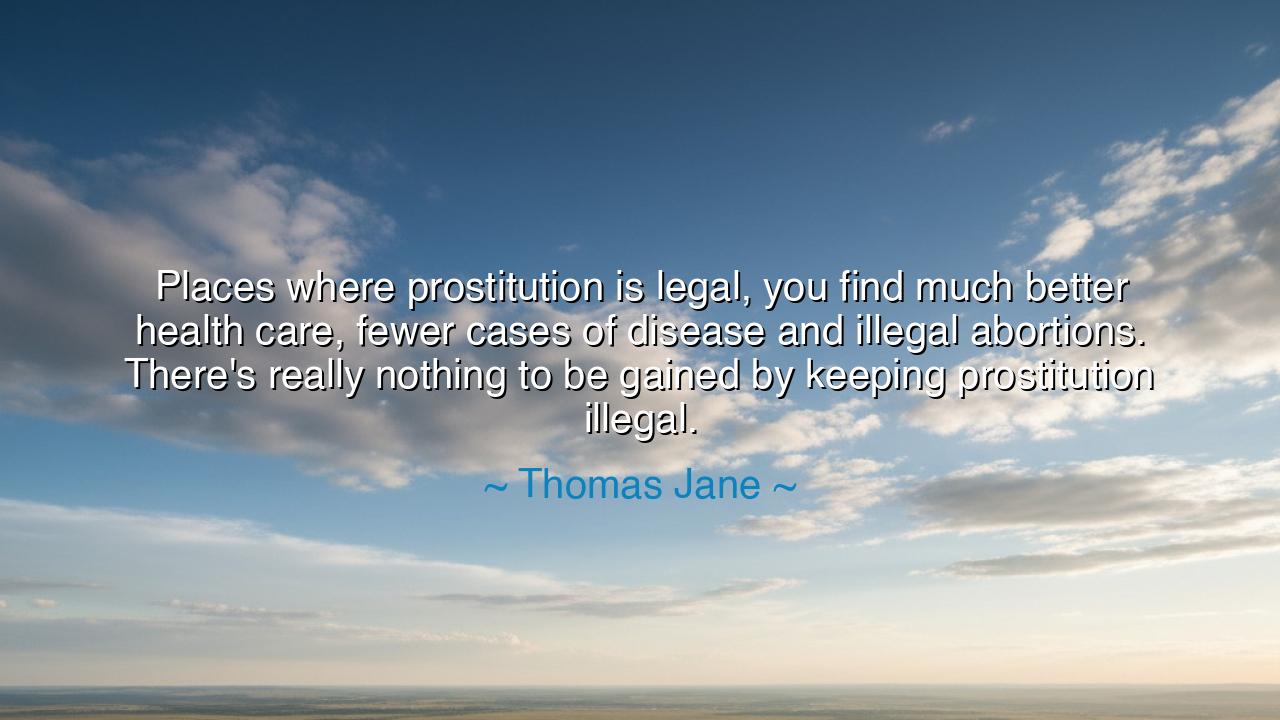
Places where prostitution is legal, you find much better health
Places where prostitution is legal, you find much better health care, fewer cases of disease and illegal abortions. There's really nothing to be gained by keeping prostitution illegal.






The words of Thomas Jane cut through centuries of moral debate with a clarity both startling and pragmatic: “Places where prostitution is legal, you find much better health care, fewer cases of disease and illegal abortions. There's really nothing to be gained by keeping prostitution illegal.” Within this statement lies not judgment, but observation — a recognition of human behavior as it is, rather than as society wishes it to be. Jane’s words remind us that law and morality do not always align with practical outcomes, and that the wisdom of governance is often measured by its ability to protect life, health, and dignity, rather than to enforce virtue.
The origin of this reflection comes from the study of social policy and public health in regions where prostitution has been legalized or decriminalized. Jane observes that when societies remove criminal penalties and regulate the trade, they create conditions for safety, medical oversight, and the reduction of harm. Legalization does not imply endorsement of vice, but rather a recognition of reality: that human desires cannot be eliminated by law, and that ignoring them only magnifies suffering and danger. His insight is the echo of a principle known to the ancients — that the purpose of law is to safeguard life, not to punish inevitability.
In the annals of history, societies that attempted to suppress human nature through strict prohibition often paid a higher price. In Renaissance Europe, prostitution was largely outlawed yet ubiquitous, and clandestine houses spread disease unchecked, while women faced harsh punishment for survival. Conversely, in places such as the Netherlands, where regulated red-light districts exist, health services are accessible, infections are monitored, and workers are given legal protections. Jane’s words highlight that prudence and regulation often yield better outcomes than moral condemnation alone.
This reflection also reveals the tension between moral ideals and human welfare. Lawgivers have always sought to impose virtue, whether in Athens, where adultery was punishable, or in medieval Europe, where sumptuary codes controlled private behavior. Yet the ancients recognized that when laws clash with nature, chaos ensues. Jane’s observation mirrors this wisdom: by keeping prostitution illegal, societies force it into the shadows, creating conditions where disease, abuse, and unsafe procedures flourish. Legal recognition, by contrast, transforms a hidden peril into a manageable challenge.
Consider the real-life example of Nevada, where prostitution is legalized and regulated in licensed counties. Workers receive regular medical examinations, have access to counseling, and operate under contractual and legal protections. Studies show significantly lower rates of sexually transmitted infections and safer working conditions than in comparable areas where prostitution is illegal. Jane’s statement is rooted in this empirical evidence: law that acknowledges and regulates human behavior does not condone immorality but protects the vulnerable and strengthens society.
Moreover, Jane’s words carry a broader philosophical lesson about the purpose of governance. The goal of law is not to eliminate vice — a task beyond human capacity — but to reduce harm, prevent suffering, and uphold the dignity of all citizens. By shifting from punishment to protection, societies demonstrate wisdom, restraint, and compassion. It is the ancient principle of utilitas, the common good, where rulers act not solely from ideology but from the practical understanding of human nature.
The moral of Jane’s insight transcends the specific topic of prostitution. It reminds us that pragmatism, guided by observation and evidence, is often superior to moral rigidity. Societies that legislate without regard for consequence invite hidden harm, while those that regulate with care safeguard health, life, and stability. The lesson for leaders and citizens alike is to focus not on what is idealized, but on what is achievable and beneficial.
So let the wisdom of Thomas Jane endure across generations: in governance and in law, seek not to punish inevitability, but to protect life. Legal recognition and regulation are not acts of moral surrender, but acts of courage and practicality. In understanding human behavior, providing safety, and minimizing harm, a society fulfills its highest purpose — that justice and compassion walk hand in hand, and that no one suffers in the shadows of moral pretense.






AAdministratorAdministrator
Welcome, honored guests. Please leave a comment, we will respond soon